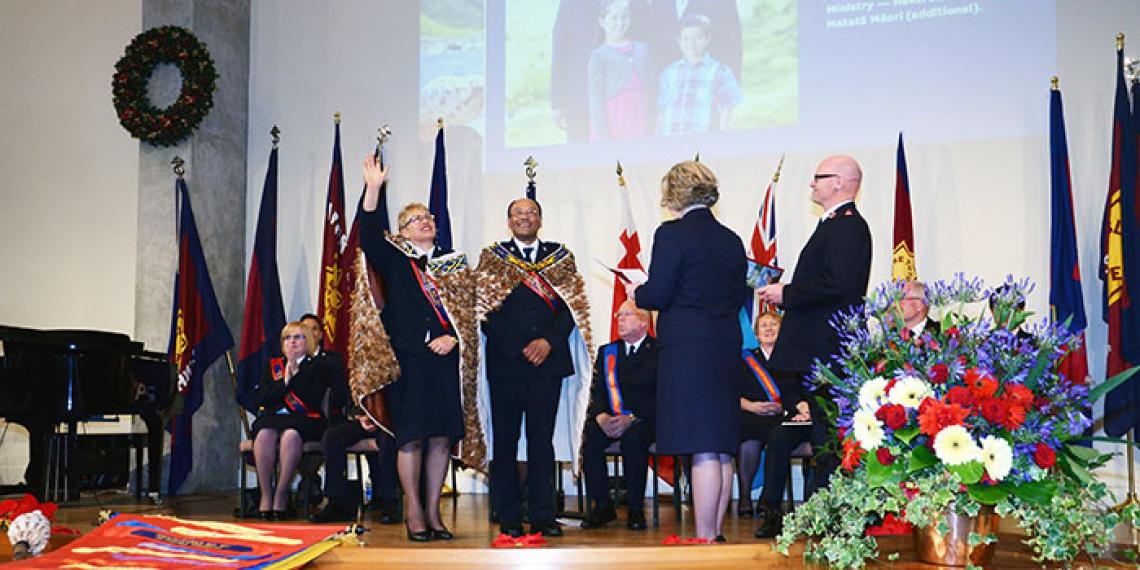You are here
New Māori Ministry Leaders

‘He iwi tahi tatou’ (now we are one people) was the phrase Captain William Hobson uttered following the signing of the Treaty of Waitangi. For Lieutenants Tau and Trish Mataki, The Salvation Army’s new national Maori leaders, that is a significant statement in their call to ministry—as they explain ...
We are truly blessed to be called to serve in this place, at this time and in this role, where hundreds of years of God’s work is converging. In 2015, this country and the Army are celebrating 200 years of Gospel in Aotearoa New Zealand, 175 years since the signing of our nation’s founding document, and the 150th birthday celebration of The Salvation Army.
But what does this all mean for us as a nation today, with some 200 cultures in residence that now call Aotearoa New Zealand their home?
The journey to these shores holds special significance to Maori as tangata whenua (first people of the land), chosen as kaitiaki (guardians) to embrace the ‘whosoever’ that may follow. This also holds in truth to the oneness Maori signed up to, on 6 February 1840—the oneness expressed in Captain William Hobson’s words ‘he iwi tahi tatou’ (now we are one people).
For us, in our new appointment, this means going out into the community and celebrating our multicultural diversity, drawing on God’s grace in reaching into people’s lives and loving them the same way Jesus loves us.
Our mission starts with Maori, but it is about bringing people together. Our heart is very much about inclusiveness: being reciprocal and caring in diversity. That’s really what we are about. That was our heart even before we came to the Army—that people needed to get along with each other better.
As national leaders of The Salvation Army’s Maori Ministry, we will continue encouraging Maori Salvationists to support the territory’s strategic goals of making disciples of Jesus, increasing the numbers of soldiers, fighting poverty and injustice, and developing leaders. We will help those within Maori work together with others as part of our connected, streamlined and mission-focused Army.
Trish and I joined the Salvation Army around three years ago. We were attracted to the Papakura Corps by the warm sense of belonging we received from its congregation, rather than because we were looking for a church to join.
We both came from extensive careers in government. Trish was a Probation Officer and Service Centre Manager, and I (Tau) came from a career in the Defence Forces and Project Advisor for the Labour Department.
We left our government jobs in 2008 to start a successful farming business and raise our beautiful mahanga mokopuna (twin grandchildren), who are in our care and schooling at kura kaupapa in Lower Hutt.
We were initially encouraged to become auxiliary officers while at Papakura Corps, but after attending the Delve leadership conference we were asked instead to apply to train at Booth College of Mission.
At Booth College of Mission I (Tau) often felt overwhelmed and lacking in the pre-requirements for college; however, after more than one visit to the mercy seat and the graceful support of college staff and fellow session mates, I made it. College presented me (Trish) with some extra challenges, too, having to take time out for an operation and recovery time midway through my first year. But through prayer, courage and determination, I completed that year alongside my colleagues.
Our hopes and aspirations in ministry are dependent on God’s will, rather than our own—which can be a mission in itself sometimes. However, we have learnt that sticking close to God through regular prayer, blessings, meditation and readings helps keep us focused.
As the new national leaders of The Salvation Army’s Maori Ministry (and for Trish in her role as Divisional Secretary for Maori Ministry in the Central Division), we will take every opportunity to familiarise ourselves with whanau kanohi ki te kanohi (face to face) and build positive relationships across the mutu (country).
We want to acknowledge all God’s work and those rangatira (leaders) that have contributed in building Maori Ministry over the years, so that it is in the healthy state we now find it. This includes rangatira such as Taylor, Holdaway, Seamer, Morris, Hirini, Rankin, Clifton, McKenzie, Moses, Hill, and Patea.
We also want to pay tribute to the late Aux-Captain Joe Patea, promoted to Glory in 2011 while serving as co-rangatira alongside his wife Aux-Captain Nan Patea. Nan had the wairua (spirit) and endurance to continue building the extensive profile of Maori Ministry, and she continues to play her part in retirement as our
kuia (female elder).
Thanks to Nan and Joe, learners can now access basic Tikanga Maori online and on CD and DVD, at our training college, and in corps setting. We also now have a Memorandum of Understanding directly with iwi and hapu, support through divisional Maori Ministry Secretaries, and, of course, rich fellowship with one another.
Maori are one of a number of international culture groups that will appear on the world stage after an invitation by General André Cox to help celebrate 150 years of The Salvation Army. It will be our privilege to travel to London this coming June as part of the kapa haka roopu (group) from New Zealand.
We would love to hear from anyone who would like to get involved in Maori Ministry or who has ideas for the ongoing development of this work. Please get in touch and we’ll do our best to respond quickly.
Ariki Atua, tukua te Wairua kia rere ki nga taumata, he arahi i a tatou mahi me te tatou whai I nga tikanga a ratouma. (Father God, allow one’s Spirit to exercise its potential, to guide us in our work as well as in our pursuit of our ancestral traditions.)
- By Tau and Trish Mataki